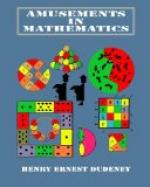“Did you hear the story of the extraordinary precocity of Mrs. Perkins’s baby that died last week?” asked Mrs. Allgood. “It was only three months old, and lying at the point of death, when the grief-stricken mother asked the doctor if nothing could save it. ‘Absolutely nothing!’ said the doctor. Then the infant looked up pitifully into its mother’s face and said—absolutely nothing!”
“Impossible!” insisted Mildred. “And only three months old!”
“There have been extraordinary cases of infantile precocity,” said Mr. Filkins, “the truth of which has often been carefully attested. But are you sure this really happened, Mrs. Allgood?”
“Positive,” replied the lady. “But do you really think it astonishing that a child of three months should say absolutely nothing? What would you expect it to say?”
“Speaking of death,” said Mr. Smoothly, solemnly, “I knew two men, father and son, who died in the same battle during the South African War. They were both named Andrew Johnson and buried side by side, but there was some difficulty in distinguishing them on the headstones. What would you have done?”
“Quite simple,” said Mr. Allgood. “They should have described one as ‘Andrew Johnson, Senior,’ and the other as ‘Andrew Johnson, Junior.’”
“But I forgot to tell you that the father died first.”
“What difference can that make?”
“Well, you see, they wanted to be absolutely exact, and that was the difficulty.”
“But I don’t see any difficulty,” said Mr. Allgood, nor could anybody else.
“Well,” explained Mr. Smoothly, “it is like this. If the father died first, the son was then no longer ‘Junior.’ Is that so?”
“To be strictly exact, yes.”
“That is just what they wanted—to be strictly exact. Now, if he was no longer ‘Junior,’ then he did not die ’Junior.” Consequently it must be incorrect so to describe him on the headstone. Do you see the point?”
“Here is a rather curious thing,” said Mr. Filkins, “that I have just remembered. A man wrote to me the other day that he had recently discovered two old coins while digging in his garden. One was dated ’51 B.C.,’ and the other one marked ‘George I.’ How do I know that he was not writing the truth?”
“Perhaps you know the man to be addicted to lying,” said Reginald.
“But that would be no proof that he was not telling the truth in this instance.”
“Perhaps,” suggested Mildred, “you know that there were no coins made at those dates.
“On the contrary, they were made at both periods.”
“Were they silver or copper coins?” asked Willie.
“My friend did not state, and I really cannot see, Willie, that it makes any difference.”
“I see it!” shouted Reginald. “The letters ‘B.C.’ would never be used on a coin made before the birth of Christ. They never anticipated the event in that way. The letters were only adopted later to denote dates previous to those which we call ‘A.D.’ That is very good; but I cannot see why the other statement could not be correct.”




